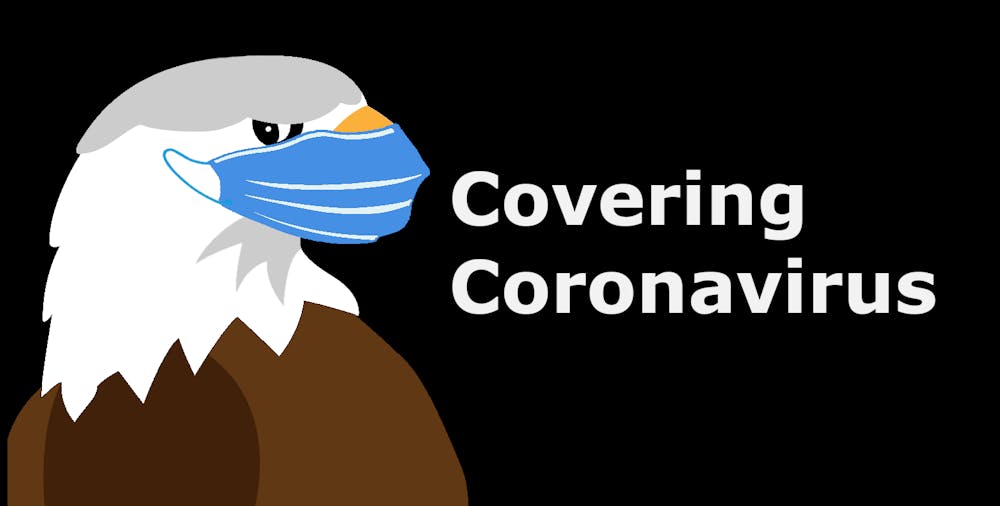Editor’s note: This article originally appeared on theeaglecoronavirusproject.com, a separate website created by Eagle staff at the onset of the coronavirus pandemic in spring 2020. Articles from that website have been migrated to The Eagle’s main site and backdated with the dates they were originally published in order to allow readers to access them more easily.
The University’s recently-announced changes to coronavirus procedures and requirements for on-campus testing will include mandatory surveillance testing, a change in the type of test and a change in the testing provider.
Medical Director Dr. David Reitman said the new procedures, which come as AU prepares to move 1,250 students to campus mid-semester, are part of a containment mitigation strategy.
“We want to identify any cases of COVID-19 as soon as possible, and if a student does test positive we want to have them in isolation before they have a chance to spread it to other people,” Reitman said.
Asymptomatic students don’t need an appointment to get tested and can access testing services during walk-in hours at Constitution Hall every weekday, but symptomatic students must make an appointment with the health center to get a test, which requires a $20 copay.
Reitman said that symptomatic students have to pay the copay since they are being evaluated by a clinician and given an assessment and treatment plan in addition to getting tested at their appointment.
“That is actually a medical visit, that is very different than a student who's just coming in who is asymptomatic and wants to just know if they have COVID, or they're being told they have to be tested in order to be on campus,” Reitman said.
Reitman said if the copay presents financial difficulty for any symptomatic student, the health center will work with them so it is not a barrier to getting tested. Reitman did not specify whether the copays would be waived or not.
The University is also changing lab providers to be able to keep up with demand for testing. With this comes a switch from a PCR swab test to a PCR saliva test. Last semester, AU used a lab service called Tempus. For the first six weeks of the spring semester, the University will use a lab called Vault, then will switch to one called Shield T3.
Reitman said that the switch will have a faster turnaround time for results and will hopefully eliminate issues that students faced with Tempus last semester, especially given that Shield T3 will also be located in D.C.
Reitman said that the University is in constant communication with the D.C. Department of Health to follow proper guidelines.
Reitman said symptomatic students are required to stay home while awaiting test results, while asymptomatic students are not. He said this is because the frequency of testing, such as on-campus students who are required to test twice a week, would leave students in constant quarantine. He said that if students who are being tested have not been exposed to anyone with the virus, it would not make sense for them to quarantine after every test.
However, the D.C. Department of Health urges those who have received tests from its public testing sites to stay home while awaiting test results.
Reitman said that the University’s new testing procedures are designed in part to be able to accommodate the larger number of students both visiting and living on-campus, especially when the mid-semester residential experience begins in March.
“If you look at universities and colleges all over the country and see where the spread happens, spread does not happen in classrooms, and it doesn’t happen in residence halls. It really happens when there are large group gatherings like a party,” he said. “So if students were to be able to follow those rules at least for the time being, then we would dramatically decrease any transmission of COVID-19.”
When asked how the University would determine outbreaks or “clusters” for those living on-campus, Reitman said that the University did not have a definition or number used to determine what constitutes an outbreak, but acknowledged the potential for community spread.
“I would say that we are living in an environment right now, where COVID-19 is reality. I think that there there is always a possibility, in fact, a good possibility that people are going to be identified who have had COVID-19,” he said. “And the best way to deal with that is to actually be able to get them into isolation as soon as possible. And that's how we decrease the amount of people who are going to be exposed.”
The University has not yet announced any new cases for the semester, but President Sylvia Burwell wrote in an email Monday that the University would soon relaunch its COVID-19 case tracker, which will now include data about the number of confirmed cases among students living on/off-campus, cases among faculty, staff and contractors, and the total number of tests performed in addition to the weekly number of confirmed cases.
Reitman said that students can prevent the spread of the virus this semester by following the guidelines and recommendations from the University and the District and not gathering in large groups.
“What we know about COVID right now is dramatically different than what we knew about it last spring. It's not just methods of trends of transmission, but treatments, the way to contain the virus, all those kinds of things,” Reitman said. “I think that we're going to be in a much better place going forward and to be able to reopen the campus safely compared to where we might have been, say, a year ago.”





